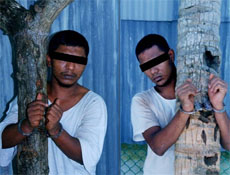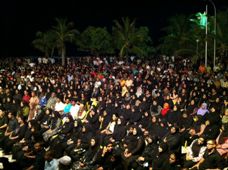Prominent NGOs have released a joint human rights brief accusing the Maldivian government of failing to create conditions conducive to free and fair elections, ahead of the Commonwealth Ministerial Action Group (CMAG) meeting to be held in London this Friday.
The International Federation for Human Rights (FIDH) and the Maldivian Democracy Network (MDN) reported that with less than six months before the presidential elections “there are clear signs indicating that the coalition government in power since February 2012 has so far failed to set the conditions for free and fair elections in which ‘all parties and leaders are able freely to conduct election campaigns’.”
“The most critical matter in this regard is the continued interference of the executive on other branches of power, as manifested by the trial of several opposition members to prevent the opposition from running in the upcoming elections,” the brief reads.
Authorities have both failed to ensure a ‘free and fair’ atmosphere with respect to freedom of information or freedom to assembly, as well as made no efforts to inform and educate voters on electoral rights and responsibilities, the report claims.
FIDH and MDN highlight that promoting and protecting human rights has suffered from a “substantial lack of progress” and that a “culture of impunity for perpetrators of past human rights violations” has been institutionalised.
While “human rights abuses reduced drastically” following former President Mohamed Nasheed’s election in 2008, past and present police brutality, torture and impunity have gone unaddressed, states the brief.
Institutions such as the Police Integrity Commission (PIC), the Human Rights Commission of the Maldives (HRCM), and a Presidential Commission – created in 2009 and disbanded in 2012 – failed to investigate and address human rights abuses, including torture committed by the police services, given their limited mandates.
“The coalition government established in February 2012 has been accused of a wide range of human rights violations, from violent repression of street protests, arbitrary arrests, sexual harassment of female protesters, torture, harassment of pro-opposition media, to legal and physical harassment of members of the opposition,” states the brief.
“Since the HRCM made public its reports on these allegations in August 2012, no action has been taken for investigation or redress,” the brief continues.
Systematic omissions have been identified in the the Commission of National Inquiry (CoNI) “serious enough to raise fundamental questions about the accuracy of the report’s conclusions.” Furthermore, recommendations made by the CoNI on August 30, 2012 regarding human rights abuses, torture, and impunity “were immediately dismissed by senior government officials; this could only encourage the security forces to disregard the rule of law and commit further human rights abuses in impunity,” the brief reads.
“Uncertainties” have caused a “new phase of slowdown” in the country’s legal reform process as well.
“Women have suffered and still suffer from the absence of a strong legal framework… and women’s rights remain at risk of being curbed by religious parties influencing the governing coalition and pushing for the full implementation of Sharia,” the report states.
Rising tensions regarding interpretations of Islam is “particularly an area of concern” given the “fundamental views being introduced by the Adalath party and some religious groups, mainly those that are being linked with Shari’a and harsh punishments,” claims the brief.
“Bearing in mind that there is absolutely no public trust in the judiciary to have the capacity to deliver justice under these circumstances, those critical of these [religious] interpretations have faced violent consequences,” reads the brief. “To date, there are no reports of an investigation or any on-going effort to find the perpetrators of these crimes [of murder and attempted murder].”
Following Nasheed’s claim he was deposed in a coup d’état, the Commonwealth suspended the Maldives from the CMAG, and said it had decided to place the Maldives on its formal agenda in February 2012 because of “questions that remain about the precise circumstances of the change of government, as well as the fragility of the situation in the Maldives.”
In September 2012, CMAG decided the Maldives would remain on the agenda under the item “Matters of Interest to CMAG”, however its suspension from the international body’s democracy and human rights arm has now been revoked.
CMAG recommendations
FIDH and MDN emphasised that the newly reformed CMAG mandate includes “situations that might be regarded as constituting a serious or persistent violation of Commonwealth values”, and the “systematic denial of political space, such as through detention of political leaders or restriction of freedom of association, assembly or expression.”
“These situations have continuously characterised the political environment of the Maldives especially since the change of power of 7 February 2012.”
FIDH and MDN provided CMAG with five key recommendations in regard to the deteriorating human rights situation in the Maldives.
They compelled CMAG to raise concerns regarding human rights violations in the Maldives, especially allegations of police brutality and torture, and request government authorities take all necessary measures to prevent violence, respect the due process of law and prevent arbitrary arrests.
A review of CMAG’s position on CoNI report should be conducted, especially in reference to “later developments”.
CMAG should also advocate for the preservation and consolidation of democratic achievements and take all necessary steps to guarantee the conditions for free, fair and inclusive elections in September 2013.
Providing technical assistance to the Maldives’ government is recommended. This is necessary to strengthen the rule of law and support the development of public institutions, in particular the judiciary, as well as independent commissions such as the HRCM, the PIC, and the Judicial Service Commission (JSC).
Finally, provide support to civil society organizations to raise public awareness about the role of public institutions and the importance of separation of powers, develop human rights education programs, and play a key role monitoring democratic and independent institution building.
Maldivian government recommendations
FIDH and MDN also provided the Maldivian government with a list of 11 recommendations to improve the country’s human rights failures.
This includes strengthening independent commissions, such as the PIC, JSC, and HRCM, in accordance with CoNI report recommendations. Reforming the judiciary should also be prioritized.
The physical and psychological integrity of human rights defenders, journalists and members of the opposition must be also guaranteed in all circumstances.
Initiating a national campaign to address past human rights violations (1978-2008), including “accountability for perpetrators, acknowledgement, truth-telling mechanisms, reparations, and legal and institutional reforms to prevent occurrence of new violations” is recommended.
“Such mechanisms would also act as a deterrent to prevent any future form of harassment, intimidation, arbitrary arrest or ill-treatment by State security personnel,” the brief states.
Additionally, the Majlis (parliament) should “urgently enact” pending legislation, ensure civil society is consulted, and that the bills “fully conform with international human rights commitments and obligations of the Maldives.” Furthermore, the death penalty should not be enshrined in those texts.
FIDH and MDN also recommend the government fulfill its various international commitments. This includes investigating allegations of torture, adopting implementing legislation for the International Criminal Court statute, as well as guaranteeing the human rights and protections enshrined in the International Covenant on Civil and Political Rights (ICCPR).
Additionally, the scope of the Maldives’ reservation to Article 16 of the Convention on the Elimination of All Forms of Discrimination against Women (CEDAW) – which aims to eliminate discrimination in all matters relating to marriage and family relations, and ensures gender equality – should be significantly reduced.
Adhering to the recommendations of various UN Special Rapporteur’s, which have addressed some of the systemic problems within the judicial system and various human rights issues, is also recommended. As is arranging future Rapporteur’s missions regarding transitional justice and additional human rights challenges.
Government reaction
Minister of State for Foreign Affairs Dhunya Maumoon told local media yesterday (April 23) that Foreign Affairs Minister Dr Abdul Samad Abdullah had left for London April 22 to participate in the CMAG meeting.
Maumoon highlighted that this marks the first occasion the Maldives has been invited to a CMAG meeting since its removal from the agenda.
“The opportunity for the Maldivian Foreign Minister to participate in a CMAG meeting was a great achievement, and one which resulted from the efforts by President Waheed’s government in cooperation with the Commonwealth,” said Maumoon.
“Now Maldives will have the opportunity to partake in discussions at CMAG. But the Maldives delegation will not be present when the group discusses the Maldives,” she added.
Maumoon also reiterated the government’s position that the Maldives should not have been on CMAG’s agenda and that “the move was prompted by a lack of understanding of the true events that transpired in the Maldives.”
“Some countries” had realized this error and accused Nasheed of influencing CMAG members, Maumoon claimed.
While Maumoon admitted “there was always a fear of instability in Maldives due to the rather infant democracy in the country,” she also highlighted that “international partners have acknowledged the positive strides the country has made brought about in a relatively peaceful manner.”
In April 2012, Maldives’ permanent representative to the EU Ali Hussein Didi criticised the Commonwealth’s involvement in the Maldives, telling the European Parliament that the Commonwealth’s Ministerial Action Group (CMAG) lacked a clear mandate to place the Maldives on its agenda.



